
|
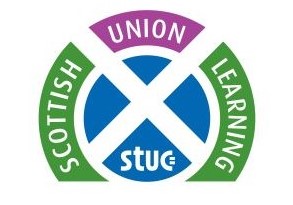
|
This collection of learning materials is primarily concerned with exploring women’s (often hidden) role in struggles in the workplace across Scotland over the period from around 1900 until the 2020s. There are currently 25 articles in this collection, each casting either a new light on - or refreshing memories of – struggles of the past, as well as some that are ongoing. New disputes and workplace struggles are constantly erupting and it is hoped that we will be able to add to the articles that are live in this collection in late 2022.
Introducing the collection
This collection of free learning resources is the outcome of a partnership between academics from the Faculty of Arts and Social Sciences at The Open University in Scotland, and Scottish Union Learning, part of the Scottish Trade Union Congress. Work on this project commenced in 2021 and the primary aim of the collection was to contribute towards filling the gap in the recorded history of women’s role in workplace struggles in Scotland over the past 120 years or so. Important investigations and research have already been done in this area but more excavation and discussion of women’s key involvement in struggles around issues such as equal pay and conditions of employment remains to be done.
 Striking women workers employed by Glasgow City Council demonstrating for equal pay in George Square Glasgow in front of the Chambers, 2018. Source: Jennifer McCarey, UNISON Scotland
Striking women workers employed by Glasgow City Council demonstrating for equal pay in George Square Glasgow in front of the Chambers, 2018. Source: Jennifer McCarey, UNISON Scotland
Women’s position in the labour market and across all sectors of the economy in Scotland in the early twenty-first century throws-up a wide range of questions and controversies. The role of women in the Scottish labour force and the contribution that women make to the Scottish economy has undergone profound change over the past fifty years or so. Far reaching social, economic, cultural and political change has led to significant shifts in the gender composition of the labour force and in sections of the economy. Further, a shift in the balance of workplace power towards owners and managers, and an increasing and widening pattern of disputes in the public sector in Scotland has become more marked since the 1980s. Alongside these shifts, UK government cuts in public service provision, service withdrawal, assorted forms of privatisation and a range of other policy strategies falling under the general umbrella of ‘austerity’ have together contributed to a significant change in the conditions of employment faced by millions of workers across Scotland and the rest of the UK. The spread and impact of the COVID-19 Pandemic during 2020-2022 has also contributed to a changing environment in many workplaces, workplaces where women are often in the majority, though in work that is often less well-paid, is temporary, part-time and or casualised in some way or another, where women continue to be discriminated against when they are pregnant and when they return from maternity leave. As Engender Scotland has highlighted, ‘women make up 78 percent of the part-time workforce in Scotland, in large part because of the lack of flexible working opportunities that can be reconciled with unpaid work. As a consequence of the persistent discrimination within the labour market, the gender pay gap in Scotland sits at 15.6 percent.’ (Engender Scotland, 2022). Furthermore, IFS analysis suggests that those working in ‘shutdown’ sectors were already almost twice as likely to be in poverty with women accounting for higher employment in many of these sectors.
Several of the articles in this collection pick-up explicitly on some of the developments highlighted above and further illustrate the ways in which the value of work by women has been socially constructed with a long history of discrimination and occupational segregation.
Susan Stewart, Director, OU Scotland:

“The Open University was founded on strong social justice principles and we champion equity through all aspects of our work.
“That’s why I’m particularly proud of this work which helps shine a light on the often hidden struggles women have faced in the workplace, in the past and right up to the present day.
“This fantastic new free resource in OpenLearn has been made richer through our collaboration with Scottish Union Learning by unlocking stories, experiences and perspectives from trade union activists across Scotland.
“The collection is particularly powerful because each article comes from either the lived experience of the author, a particular work or political interest or a personal role within a strike or dispute. These are voices that should be heard.”
Angela Bradley, EIS General Secretary, and Chair of the STUC Women's Committee:
 “Without women, society as we know it would crumble, yet for far too long, women’s contributions to history have gone unacknowledged.
“Without women, society as we know it would crumble, yet for far too long, women’s contributions to history have gone unacknowledged.
“Women’s workplace rights are not fringe issues, but rather trade union struggles and without these hard-won fights we would not be where we are today as a movement. Sharing our stories and making our voices heard adds to our collective strength.
“This project, and growing archive, is an important step to set the record straight and for women to take our rightful place in trade union history.”
Khadija Patel, Partnerships Manager, OU in Scotland
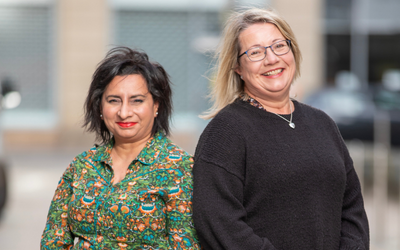 Khadija Patel and Suzi Collins“This is a heartfelt collection of trade union activities highlighting that it is through storytelling that we share with each other and with future generations how we challenged inequities within the workplace.
Khadija Patel and Suzi Collins“This is a heartfelt collection of trade union activities highlighting that it is through storytelling that we share with each other and with future generations how we challenged inequities within the workplace.
“We continue to build on this project and are particularly keen to hear from those who have been involved in struggles around issues such as pay and fairness at work, defending jobs as well as campaigns, disputes and strikes to defend or improve workplace conditions. We are interested to hear from across all sectors of the economy and from every locality in Scotland.”
Suzi Collins, OU Associate Lecturer in Social Science and author:
“Far reaching social, economic, cultural and political changes over the last 120 years contribute to the discrimination that women have faced, and this continues right up to the present day when austerity polices and the Covid pandemic have impacted more on women.
“The Women and Workplace Struggles collection provides vital social context as we continue to tackle discrimination. There is still today a significant gender pay gap in Scotland with women often less well-paid, in temporary, part-time and or casualised roles.
“The development of Women and Workplace Struggles took place over two years, and it has been created as a living archive with a call-out issued today for public submissions, historical pieces, contemporary stories, photographs and other visual material to add to the collection.”
Introducing the Women and Workplace Struggles in Scotland project team
Details of those involved can be found under author profiles on the right, and they include Gerry Mooney (academic lead), Helen O'Shea, Carol Raeside, Khadija Patel, Suzi Collins, Thora Hands, Mags McCarthy and Tricia McCafferty. The Women and Workplace Struggles project was a collaborative partnership between The Open University in Scotland and Scottish Union Learning. The key contributors from SUL were Tommy Breslin and Anna Mehta.
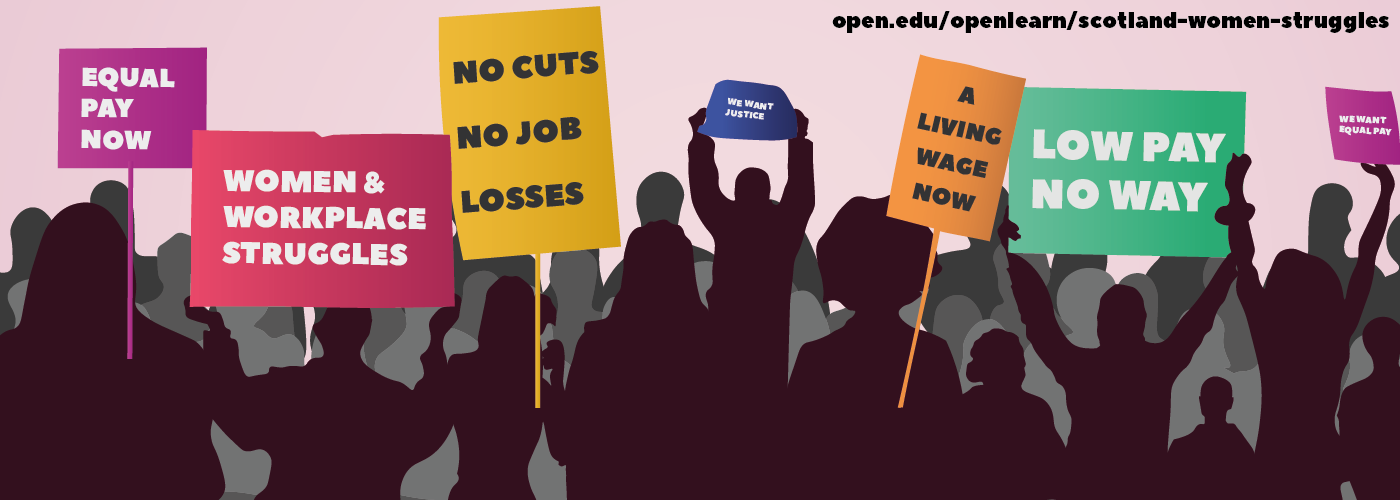
Women and Workplace Struggles: Scotland 1900-2022
Multiple places of work
The meaning of work itself has long been contested and such contestation applies to the notion of a ‘workplace’ too. The dominant representations of work and workplace in our society remain, despite long-term criticisms powerful and necessitate being approached in a critically informed way. For the majority of women workers, ‘work’ takes places in multiple ‘workplaces’, as it does for many men too. These transcend what is often (mis)represented as ‘real workplaces’, that is the spaces and places of paid employment outwith the home. In a number of the articles in the collection, attention is drawn to the particular impact on women of the multiplicity of workplaces – home, community and formal places of paid employment (though of course with the COVID-19 Pandemic, home has become a formal workplace for millions of women workers in different and multiple ways from how this was imagined in the past).
The distinction between those workplaces which are characterised as locales of paid employment and places and locations of unpaid work – primarily in the home or a home-setting of others such as relatives, friends and as well as in the ‘community’ – has long broken-down. However, the complex and changing entanglements of both have taken on new meanings across the first few decades of this century.
Homeworking, that is being allowed or enabled to undertake paid employment at home, has become a reality for millions of male workers too with varying consequences for the division of domestic labour within the home. ‘Whether it’s dishwashing, laundry, childcare, reading to kids, physical care, we’re seeing a universal movement toward more egalitarian sharing.’ This was the claim of two observers in The Guardian in 2020, as the grip of the COVID-19 Pandemic across Scotland, the UK and globally, deepened and intensified.
Important that these debates are, this project was specifically concerned with the often-neglected role of women workers in struggles in non-domestic places of paid employment (though their role in struggles around paid forms of work in the home workplace has also been under-researched).
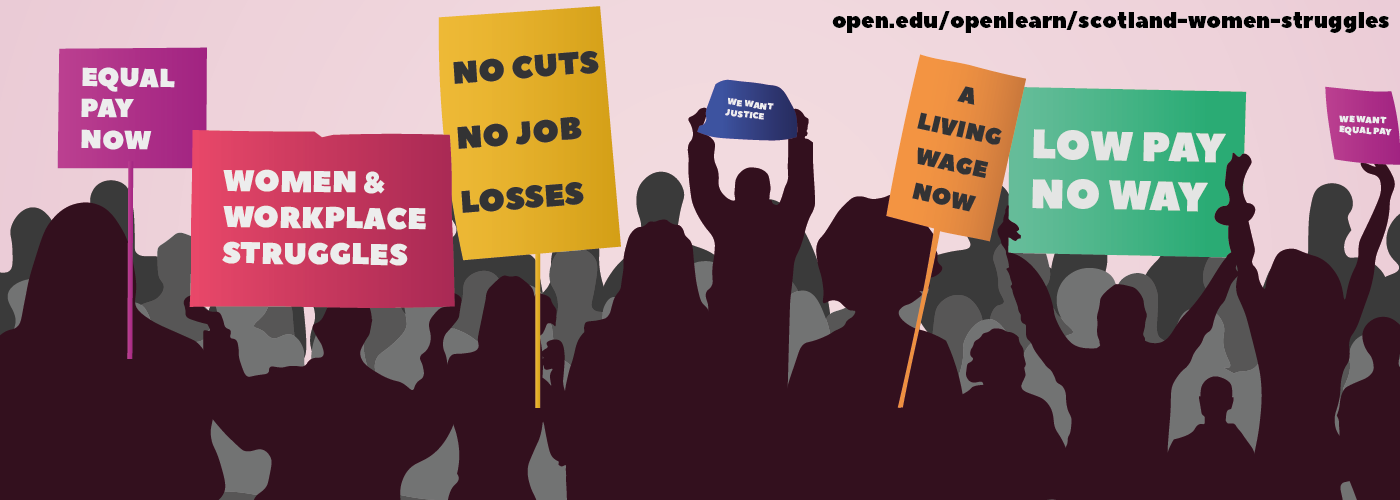
On the diversity of experiences of women workers
Each of the articles contained in this collection represent either the lived experience of the author, a particular work related and or political interest as well as a personal role within a strike or dispute. The situation that women workers find themselves in varies hugely: the label ‘women workers’ can at times fail to capture the massive differences in the work done by women. From the outset we were keen to ensure that a diversity of experiences was captured in this collection and that these also included women from different ethnic groups and from other women who were engaged in forms of paid work that may be widely regarded as ‘not work’, for instance, ‘sex work’.
While there is always scope to do more with regards to the diversity of experiences and the diversity of people included, the stories contained in the various pieces here echo the different positions that different women and different groups of women find occupying in the workplace. The range of experiences portrayed and reported in the diverse pieces in our collection demonstrate the unique nature of women’s workplace struggles and but also the ways in which these are entangled with wider working class struggles within the workplace and in working class communities.
Public sector and private sector work
With the introduction of devolution and the re-opening of the Scottish Parliament in 1999, key areas of public sector employment – and employment in agencies or organisations that had been privatised but were still nominally considered to be ‘public sector’ – came under the control and direction of the Scottish Government whereas in pre-devolution Scotland the Scottish Office, under the control of the UK government, had since 1885 enjoyed responsibility for the delivery of education and other areas of policy implementation in Scotland. Throughout the twentieth century, housing, health, social services and other sectors came under the auspices of the Scotland Office in London. Devolution shifted responsibility to the reconvened Scottish Parliament in Edinburgh in 1999 and along with this a range of other areas of public services were classed as ‘devolved’.
Why is this important for this collection? The Scottish Parliament was from its re-establishment in 1999, very much a social policy making institution. The NHS in Scotland, housing, social work, social care, transport, local authorities, and other important areas such as education and criminal justice (which were always ‘Scottish’ in any case, predated not only devolution but the Act of Union of 1707 establishing the United Kingdom), came under the auspices of the Scottish Parliament. With the further devolution of powers from London to Edinburgh since 1999, more areas have come to be under the control of the Holyrood Parliament, such as parts of the welfare benefits system.
In March 2021, almost 22% of employment in Scotland, around 560,000 workers, were employed directly in the public sector. This varies markedly across different parts of Scotland. Not surprisingly, the key sectors of the economy that are the responsibility of the Scottish Parliament – the ‘big’ social policy services such as health, social care, social work and education, for instance – are numerically dominated by women workers.
In each and every year since the introduction of devolution for Scotland, there has been at least one major dispute or strike in one of the major areas of the public sector. In places such as Glasgow and Dundee, these have been more frequent.
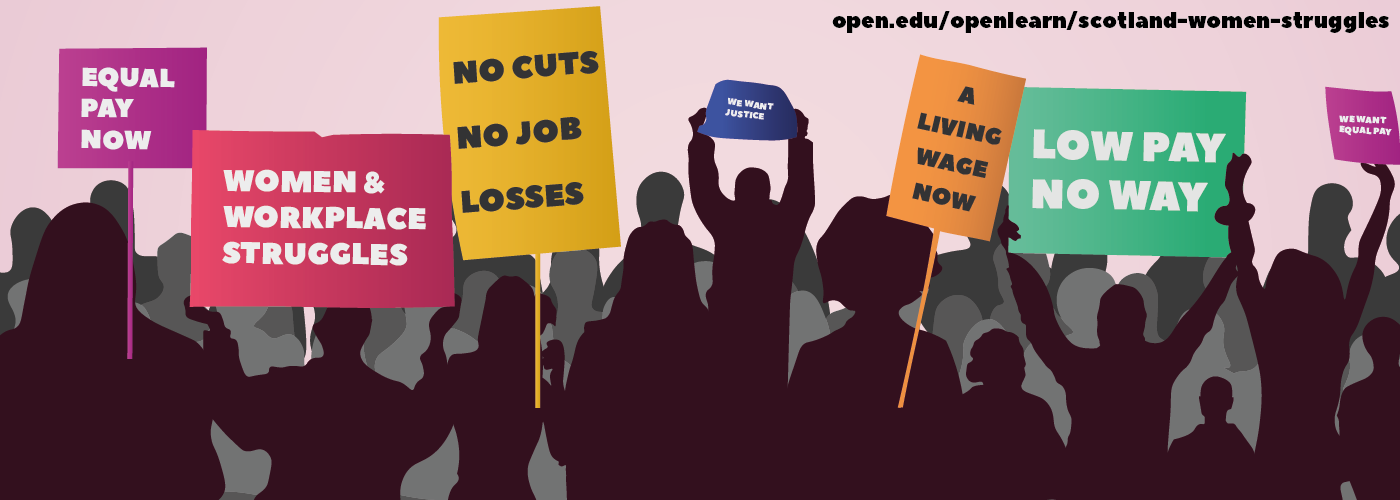
Women and Workplace Struggles in Scotland: Our Approach
The contributions to this collection have come from both women as well as men who have been involved in trade union activism and politics and or workplace disputes in Scotland. The project supported a number of contributors who have not written for a public source such as this. Through our partners at Scottish Union Learning, the project was publicised to STUC affiliated trade unions in Scotland, trades councils in different parts of Scotland and activists who have experience of struggle in workplaces.
A central objective of the project was to produce a collection of pieces that would be accessible to a wide range of audiences. In addition to text-based pieces, we have received audio and video recordings, poems, images and personal stories. Where appropriate and relevant, these have been woven together to create a diverse mix of learning content that can be used to support trade unions and trade union members and other groups now and in the future.
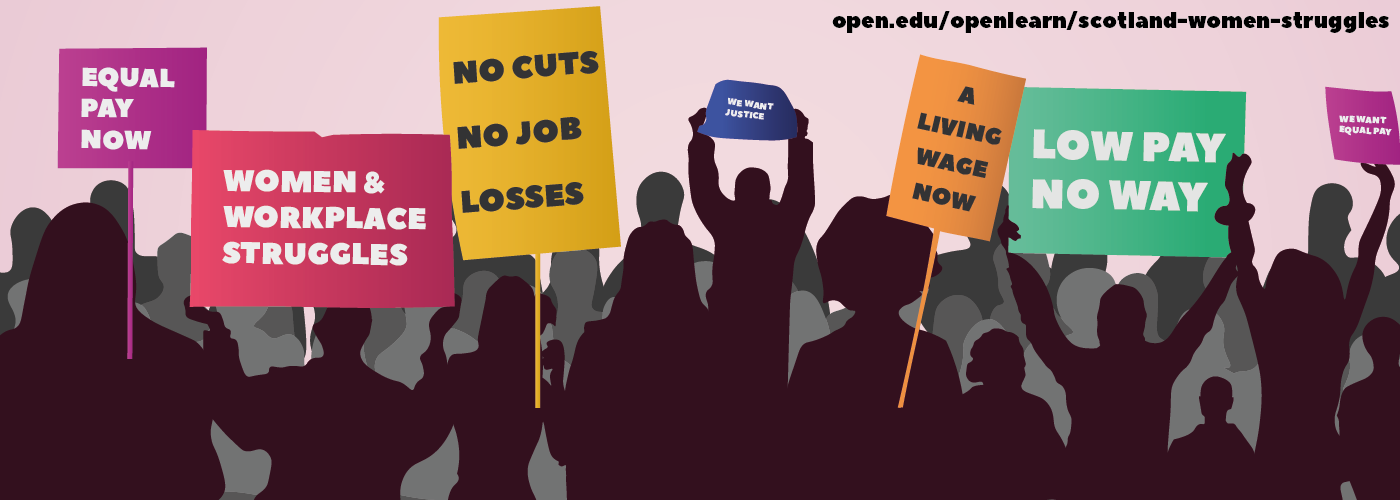
Women and Workplace Struggles in Scotland: A Living Collection
This collection of articles was largely produced over the period from early 2021-2022. Although formally launched towards the end of 2022, the collection was always imagined as a living collection. As new disputes take place, more strikes emerge and other developments that impact on the workplace and the position of women within it become more apparent, new materials will be produced, new content authored. This collection of learning content was always envisaged as a living collection. It is hoped that the collection will grow and grow over the years to come, encompassing issues and experiences that were perhaps insufficiently covered when the collection was first launched.
2022-2023: Another Winter of Discontent?
 As the project was ending in late 2022, Scotland and the rest of the UK were experiencing one of the most intense and widespread levels of strikes and other forms of industrial action in some considerable time.
As the project was ending in late 2022, Scotland and the rest of the UK were experiencing one of the most intense and widespread levels of strikes and other forms of industrial action in some considerable time.
The term ‘Winter of Discontent’ has gone down in history as marking an early period, late 1978-early 1979, when strikes were widespread and millions of workers were involved in disputes during a period of severe economic crisis for the UK.
Throughout 2022 and continuing into 2023, a new ‘cost of living crisis’ has impacted on tens of millions of people across the UK and this has been a key driver in the new wave of strikes and disputes.
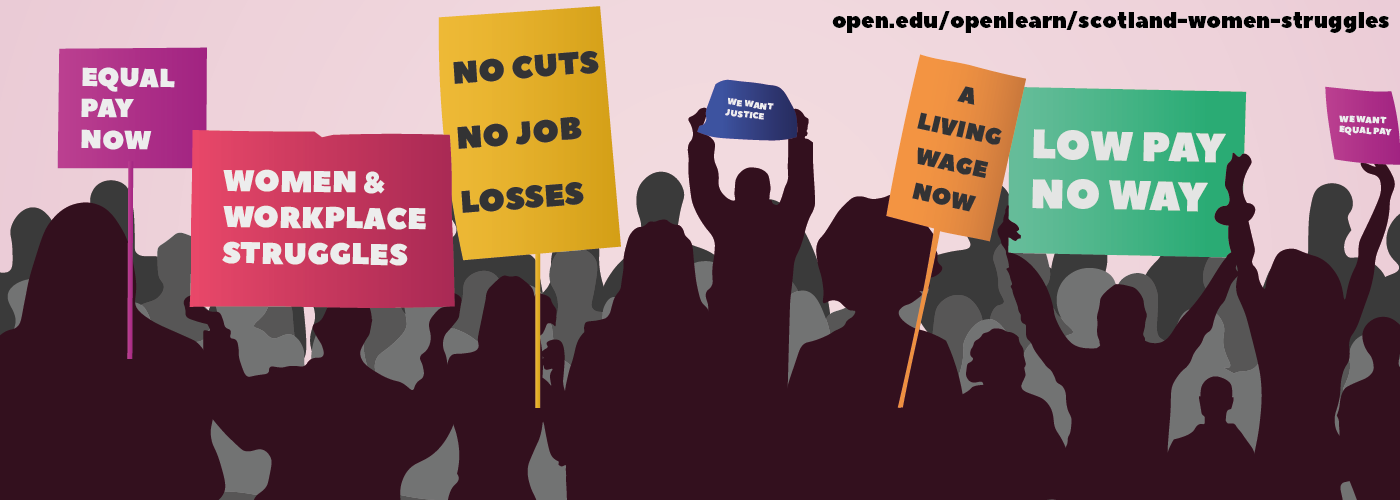
Contributing to this project
If you are interested in contributing to this project, please write to us at:
scotland-socsci@open.ac.uk
We are particularly keen to hear from women workers, and from male trade unionists, who have been involved in struggles around issues such as pay and fairness at work, defending jobs as well as campaigns to defend or improve workplace conditions. We are also interested in disputes and strikes more generally from across all sectors of the economy and from any and every locality in Scotland. We are also keen to capture both historical pieces produced mainly through secondary research as well as contemporary stories, interviews and accounts of particular events.
We are happy to receive contributions from trade union groups, local history societies, activist groups and trade union sponsored learners. Materials focusing on any dimension of women’s role in workplace struggles, disputes and conflict, will be welcome. If you have images, photographs, dispute paraphernalia (leaflets, flyers, posters and so on) we would also be pleased to hear from you. If you are willing to allow us to use this material on OpenLearn, you will of course be credited for this.
Other related collections

As with this collection, the Women and Scottish History Railway Collection also provides a diverse range of learning materials, authored by women members of the RMT in Scotland. These materials in this collection collectively offer audio and video resources, text, personal accounts, interviews and images, focusing on different aspects of women’s role in Scotland’s railway history. It is anticipated that these materials will be used by RMT activists and members today and into the future and will encourage other members to research and write about other aspects of this history.

 Edited by Daniel Gray and published by Luath Press in June 2022,
Edited by Daniel Gray and published by Luath Press in June 2022, 



































Rate and Review
Rate this article
Review this article
Log into OpenLearn to leave reviews and join in the conversation.
Article reviews